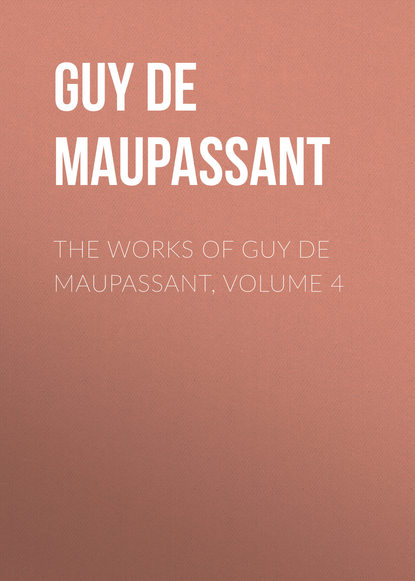По всем вопросам обращайтесь на: info@litportal.ru
(©) 2003-2024.
✖
The Works of Guy de Maupassant, Volume 4
Настройки чтения
Размер шрифта
Высота строк
Поля
"Tell him that M. Merlin wishes to speak to him."
She replied, in amazement:
"Hey! go inside then, if you want to see him."
And she bawled out:
"Monsieur Duchoux – a call."
The baron entered, and in a spacious apartment, rendered dark by the windows being half-closed, he indistinctly traced out persons and things, which appeared to him very slovenly looking.
Standing in front of a table laden with articles of every sort, a little bald man was tracing lines on a large sheet of paper.
He interrupted his work, and advanced two steps. His waistcoat left open, his unbuttoned breeches, and his turned-up shirt-sleeves, indicated that he felt hot, and his muddy shoes showed that it had rained hard some days before.
He asked with a very pronounced southern accent:
"Whom have I the honor of – ?"
"Monsieur Merlin – I came to consult you about a purchase of building-ground."
"Ha! ha! very well!"
And Duchoux, turning towards his wife, who was knitting in the shade:
"Clear off a chair, Josephine."
Mordiane then saw a young woman, who appeared already old, as women look old at twenty-five in the provinces, for want of attention to their persons, regular washing, and all the little cares bestowed on feminine toilet which make them fresh, and preserve, till the age of fifty, the charm and beauty of the sex. With a neckerchief over her shoulders, her hair clumsily braided – though it was lovely hair, thick and black, you could see that it was badly brushed – she stretched out towards a chair hands like those of a servant, and removed an infant's robe, a knife, a fag-end of packe-bread, an empty flower-pot, and a greasy plate left on the seat, which she then moved over towards the visitor.
He sat down, and presently noticed that Duchoux's work-table had on it, in addition to the books and papers, two salads recently gathered, a wash-hand basin, a hair-brush, a napkin, a revolver, and a number of cups which had not been cleaned.
The architect perceived this look, and said with a smile:
"Excuse us! there is a little disorder in the room – it is owing to the children."
And he drew across his chair, in order to chat with his client.
"So then you are looking out for a piece of ground in the neighborhood of Marseilles?"
His breath, though not close to the baron, carried towards the latter that odor of garlic which the people of the South exhale as flowers do their perfume.
Mordiane asked:
"Is it your son that I met under the plane-trees?"
"Yes. Yes, the second."
"You have two of them?"
"Three, monsieur; one a year."
And Duchoux looked full of pride.
The baron was thinking:
"If they all have the same perfume, their nursery must be a real conservatory."
He continued:
"Yes, I would like a nice piece of ground near the sea, on a little solitary strip of beach – "
Thereupon Duchoux proceeded to explain. He had ten, twenty, fifty, a hundred, or more, pieces of ground of the kind required, at different prices and suited to different tastes. He talked just as a fountain flows, smiling, self-satisfied, wagging his bald round head.
And Mordiane was reminded of a little woman, fair-haired, slight, with a somewhat melancholy look, and a tender fashion of murmuring, "My darling," of which the mere remembrance made the blood stir in his veins. She had loved him passionately, madly, for three months; then, becoming pregnant in the absence of her husband, who was a governor of a colony, she had run away and concealed herself, distracted with despair and terror, till the birth of the child, which Mordiane carried off one summer's evening, and which they had not laid eyes on afterwards.
She died of consumption three years later, over there, in the colony of which her husband was governor, and to which she had gone across to join him. And here, in front of him, was their son, who was saying, in the metallic tones with which he rang out his closing words:
"This piece of ground, monsieur, is a rare chance – "
And Mordiane recalled the other voice, light as the touch of a gentle breeze, as it used to murmur:
"My darling, we shall never part – "
And he remembered that soft, deep, devoted glance in those eyes of blue, as he watched the round eye, also blue, but vacant, of this ridiculous little man, who, for all that, bore a resemblance to his mother.
Yes, he looked more and more like her every moment – like her in accent, in movement, in his entire deportment – he was like her in the way an ape is like a man; but still he was hers; he displayed a thousand external characteristics peculiar to her, though in an unspeakably distorted, irritating, and revolting form.
The baron was galled, haunted as he was all of a sudden by this resemblance, horrible, each instant growing stronger, exasperating, maddening, torturing him like a nightmare, like a weight of remorse.
He stammered out:
"When can we look at this piece of ground together?"
"Why, to-morrow, if you like."
"Yes, to-morrow. At what hour?"
"One o'clock."
"All right."
The child he had met in the avenue appeared before the open door, exclaiming:
"Dada!"
There was no answer.
Mordiane had risen up with a longing to escape, to run off, which made his legs tremble. This "dada" had hit him like a bullet. It was to him that it was addressed, it was intended for him, this "dada," smelling of garlic – this "dada" of the South.

















